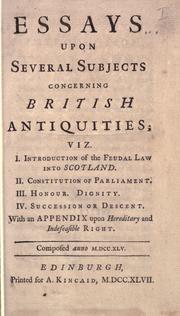Recently Posted
· This brief essay demonstrated how early political thinkers such as Cicero, John Locke, and the Whigs, influenced John Adams and his , A Dissertation on the Canon and Feudal Law. His essay was an argument against the March 22, , Stamp Act. This law was created by King George III and the British Parliament · “A Dissertation on the Canon and the Feudal Law,” No. 1, 12 August III. “A Dissertation on the Canon and the Feudal Law,” No. 1 [, Start insertion, Monday, 12 August , End,] To the Printers. “IGNORANCE and inconsideration are the two great causes of · “A Dissertation on the Canon and the Feudal Law,” No. 4 [, Start insertion, Monday, 21 October , End,] WE have been afraid to think. We have felt a reluctance to examining into the grounds of our privileges, and the extent in which we have an indisputable right to demand them against all the power and authority, on earth

PURSUING KNOWLEDGE & DEFENDING LIBERTY
Since the promulgation of Christianity, the two greatest systems of tyranny that have sprung from this original, are the canon and the feudal law. The desire of dominion, that great principle by which we have attempted to account for so much good and so much evil, is, when properly restrained, a very useful and noble movement in the human mind · In , at the age of 29 he wrote an amazing essay, which later came to be called “A Disserta- tion on Canon and Feudal Law,” and which was subsequently published in the Boston Gazette as well as the London Chronicle. It contains one of the great tributes to our Pilgrim and Puritan forefathers · adams wrote ″a dissertation on the canon and feudal law″ in , which justified opposition to the recently enacted stamp blogger.com stamp act was an attempt to raise revenue by requiring all publications and legal documents to bear a blogger.com justified opposition to the stamp act by arguing that parliament’s intrusions into colonial affairs

Post navigation
· “A Dissertation on the Canon and the Feudal Law,” No. 1, 12 August III. “A Dissertation on the Canon and the Feudal Law,” No. 1 [, Start insertion, Monday, 12 August , End,] To the Printers. “IGNORANCE and inconsideration are the two great causes of · “A Dissertation on the Canon and the Feudal Law,” No. 3 [, Start insertion, Monday, 30 September , End,] 1 TO have holden their lands, allodially, or for every man to have been the sovereign lord and proprietor of the ground he occupied, would have constituted a government, too nearly like a commonwealth · “A Dissertation on the Canon and the Feudal Law,” No. 4 [, Start insertion, Monday, 21 October , End,] WE have been afraid to think. We have felt a reluctance to examining into the grounds of our privileges, and the extent in which we have an indisputable right to demand them against all the power and authority, on earth

Popular Right Now
· In , at the age of 29 he wrote an amazing essay, which later came to be called “A Disserta- tion on Canon and Feudal Law,” and which was subsequently published in the Boston Gazette as well as the London Chronicle. It contains one of the great tributes to our Pilgrim and Puritan forefathers Since the promulgation of Christianity, the two greatest systems of tyranny that have sprung from this original, are the canon and the feudal law. The desire of dominion, that great principle by which we have attempted to account for so much good and so much evil, is, when properly restrained, a very useful and noble movement in the human mind · “A Dissertation on the Canon and the Feudal Law,” No. 1, 12 August III. “A Dissertation on the Canon and the Feudal Law,” No. 1 [, Start insertion, Monday, 12 August , End,] To the Printers. “IGNORANCE and inconsideration are the two great causes of

· “A Dissertation on the Canon and the Feudal Law,” No. 1, 12 August III. “A Dissertation on the Canon and the Feudal Law,” No. 1 [, Start insertion, Monday, 12 August , End,] To the Printers. “IGNORANCE and inconsideration are the two great causes of · This brief essay demonstrated how early political thinkers such as Cicero, John Locke, and the Whigs, influenced John Adams and his , A Dissertation on the Canon and Feudal Law. His essay was an argument against the March 22, , Stamp Act. This law was created by King George III and the British Parliament In Adams wrote “A Dissertation on the Canon and Feudal Law,” which justified opposition to the recently enacted Stamp Act—an effort to raise revenue by requiring all publications and legal documents to bear a stamp—by arguing that Parliament’s intrusions into colonial affairs exposed the inherently coercive and corrupt Read More
No comments:
Post a Comment